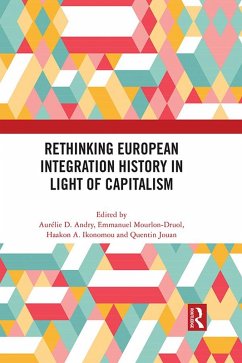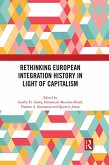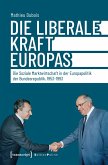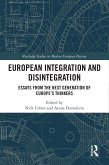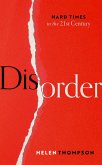Rethinking European Integration History in Light of Capitalism (eBook, PDF)
Redaktion: Andry, Aurélie D.; Jouan, Quentin; Ikonomou, Haakon A.; Mourlon-Druol, Emmanuel
42,95 €
42,95 €
inkl. MwSt.
Sofort per Download lieferbar

21 °P sammeln
42,95 €
Als Download kaufen

42,95 €
inkl. MwSt.
Sofort per Download lieferbar

21 °P sammeln
Jetzt verschenken
Alle Infos zum eBook verschenken
42,95 €
inkl. MwSt.
Sofort per Download lieferbar
Alle Infos zum eBook verschenken

21 °P sammeln
Rethinking European Integration History in Light of Capitalism (eBook, PDF)
Redaktion: Andry, Aurélie D.; Jouan, Quentin; Ikonomou, Haakon A.; Mourlon-Druol, Emmanuel
- Format: PDF
- Merkliste
- Auf die Merkliste
- Bewerten Bewerten
- Teilen
- Produkt teilen
- Produkterinnerung
- Produkterinnerung

Bitte loggen Sie sich zunächst in Ihr Kundenkonto ein oder registrieren Sie sich bei
bücher.de, um das eBook-Abo tolino select nutzen zu können.
Hier können Sie sich einloggen
Hier können Sie sich einloggen
Sie sind bereits eingeloggt. Klicken Sie auf 2. tolino select Abo, um fortzufahren.

Bitte loggen Sie sich zunächst in Ihr Kundenkonto ein oder registrieren Sie sich bei bücher.de, um das eBook-Abo tolino select nutzen zu können.
This book outlines the possibilities and perspectives of an intertwining of European integration historiography with the history and concept of capitalism - an issue almost completely eluded so far by the historians of this field.
- Geräte: PC
- mit Kopierschutz
- eBook Hilfe
Andere Kunden interessierten sich auch für
![Rethinking European Integration History in Light of Capitalism (eBook, ePUB) Rethinking European Integration History in Light of Capitalism (eBook, ePUB)]() Rethinking European Integration History in Light of Capitalism (eBook, ePUB)42,95 €
Rethinking European Integration History in Light of Capitalism (eBook, ePUB)42,95 €![Capitalism and Religion in World History (eBook, PDF) Capitalism and Religion in World History (eBook, PDF)]() Carl MoskCapitalism and Religion in World History (eBook, PDF)56,95 €
Carl MoskCapitalism and Religion in World History (eBook, PDF)56,95 €![Die liberale Kraft Europas (eBook, PDF) Die liberale Kraft Europas (eBook, PDF)]() Mathieu DuboisDie liberale Kraft Europas (eBook, PDF)0,00 €
Mathieu DuboisDie liberale Kraft Europas (eBook, PDF)0,00 €![European Integration and Disintegration (eBook, PDF) European Integration and Disintegration (eBook, PDF)]() European Integration and Disintegration (eBook, PDF)42,95 €
European Integration and Disintegration (eBook, PDF)42,95 €![The Transatlantic Era (1989-2020) in Documents and Speeches (eBook, PDF) The Transatlantic Era (1989-2020) in Documents and Speeches (eBook, PDF)]() The Transatlantic Era (1989-2020) in Documents and Speeches (eBook, PDF)44,95 €
The Transatlantic Era (1989-2020) in Documents and Speeches (eBook, PDF)44,95 €![Disorder (eBook, PDF) Disorder (eBook, PDF)]() Helen ThompsonDisorder (eBook, PDF)10,95 €
Helen ThompsonDisorder (eBook, PDF)10,95 €![Britain, France and the Battle for the Leadership of Europe, 1957-2007 (eBook, PDF) Britain, France and the Battle for the Leadership of Europe, 1957-2007 (eBook, PDF)]() Richard DavisBritain, France and the Battle for the Leadership of Europe, 1957-2007 (eBook, PDF)42,95 €
Richard DavisBritain, France and the Battle for the Leadership of Europe, 1957-2007 (eBook, PDF)42,95 €-
-
-
This book outlines the possibilities and perspectives of an intertwining of European integration historiography with the history and concept of capitalism - an issue almost completely eluded so far by the historians of this field.
Dieser Download kann aus rechtlichen Gründen nur mit Rechnungsadresse in A, B, BG, CY, CZ, D, DK, EW, E, FIN, F, GR, HR, H, IRL, I, LT, L, LR, M, NL, PL, P, R, S, SLO, SK ausgeliefert werden.
Produktdetails
- Produktdetails
- Verlag: Taylor & Francis eBooks
- Seitenzahl: 210
- Erscheinungstermin: 1. Juni 2022
- Englisch
- ISBN-13: 9781000596632
- Artikelnr.: 63648584
- Verlag: Taylor & Francis eBooks
- Seitenzahl: 210
- Erscheinungstermin: 1. Juni 2022
- Englisch
- ISBN-13: 9781000596632
- Artikelnr.: 63648584
- Herstellerkennzeichnung Die Herstellerinformationen sind derzeit nicht verfügbar.
Aurélie D. Andry is Research Fellow at Université Paris-Saclay and a member of the ANRDFG-funded project 'Workplace democracy: a European ideal?: discourses and practices about the democratization of work after 1945'. Her research focuses mainly on the history of European integration and the history of socialism and trade unionism in Europe. Emmanuel Mourlon-Druol is Professor of International Economic History at the University of Glasgow, and Non Resident Fellow at the Brussels-based think tank Bruegel. Prior to coming to the University of Glasgow, Emmanuel held the Pinto Postdoctoral fellowship at the London School of Economics (LSE). He is the author of A Europe Made of Money: the Emergence of the European Monetary System (2012) and co-editor of International Summitry and Global Governance: the Rise of the G-7 and the European Council, 1974-1991 (with Federico Romero, Routledge 2014). His work has appeared in Business History, Contemporary European History, JCMS: Journal of Common Market Studies and West European Politics, among others. Haakon A. Ikonomou is Gerda Henkel Fellow and Teaching Associate Professor at the Saxo Institute, University of Copenhagen. Ikonomou is co-founder and steering committee member of Global Biography Working Group (GloBio), review and online media editor of Diplomatica (Brill) and the New Diplomatic History Network, and co-director of the Europe and International Cooperation Research Group at the Centre for Modern European Studies (CEMES). Quentin Jouan is a strategy consultant and a guest lecturer in different Belgian universities. As a consultant, he is supporting public and private organisations in defining long-term strategies and coping with regulatory, environmental and societal challenges. As a lecturer, Quentin is teaching Belgian and European institutional history. His research area focuses on the socio-economic interplay between national actors and European institutions as well as on the history of the legal regulation of capitalism.
Introduction - Rethinking European integration history in light of capitalism: the case of the long 1970s 1. Stabilization through integration: the European rescue of Italian capitalism 2. European integration and the paradoxical answers of national trade unions to the crises of capitalism 3. Crises and transformations of European integration: European business circles during the long 1970s 4. Crisis, capitalism and common policies: Greek and Norwegian responses to common shipping policy efforts in the 1960s and 1970s 5. A globalization laboratory: European banking regulation and global capitalism in the 1970s and early 1980s 6. Crisis and continuity: Robert Marjolin, transnational policy-making and neoliberalism, 1930s-70s 7. The European Commission facing crisis: social, neo-mercantilist and market-oriented approaches (1967-85) 8. Was there an alternative? European socialists facing capitalism in the long 1970s
Introduction - Rethinking European integration history in light of capitalism: the case of the long 1970s 1. Stabilization through integration: the European rescue of Italian capitalism 2. European integration and the paradoxical answers of national trade unions to the crises of capitalism 3. Crises and transformations of European integration: European business circles during the long 1970s 4. Crisis, capitalism and common policies: Greek and Norwegian responses to common shipping policy efforts in the 1960s and 1970s 5. A globalization laboratory: European banking regulation and global capitalism in the 1970s and early 1980s 6. Crisis and continuity: Robert Marjolin, transnational policy-making and neoliberalism, 1930s-70s 7. The European Commission facing crisis: social, neo-mercantilist and market-oriented approaches (1967-85) 8. Was there an alternative? European socialists facing capitalism in the long 1970s
